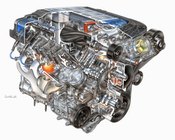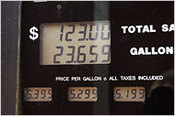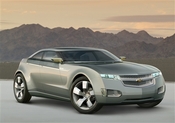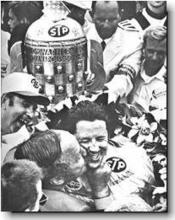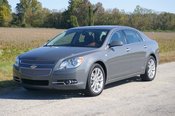If you think car-makers, especially the Detroit Three, aren't interested in life out here in the
real world, rest easy.
I hold in my hands a press release from a car-maker industry group which demonstrates that they are indeed paying attention to the rest of us. Not fast enough or with the sense of urgency it demands, but maybe they're finally figuring out what a lot of us have been demanding from our cars and trucks ... and not in 15 years, either. Don't tell us how much longer we need to wait when dealing with technologies which have been around for 100 years or more.
This press release intends to remove the car-makers from any blame whatsoever, saying little to nothing about the future product they're trying to design, build and market. In fact, they think that we buyers and drivers also need to straighten up and fly right, as the old standard song goes, so they do offer some help for we poor plebeians, something they've dubbed "EcoDriving."
(This is artist David Kimball's ghost view of the Chevrolet Corvette engine; looks great, but belongs, mostly, on a race track).
Among these tips to drivers are knowing which oil to use in your car and don't tailgate. And no, I'm not kidding. More on Ecodriving in a bit.
First, meet the Alliance of Automobile Manufacturers (AAM). It's a trade association (lobbyists) of 10 car and light truck manufacturers making or selling cars and trucks in the US, including BMW Group, Chrysler, Ford Motor Company, General Motors, Mazda, Mercedes-Benz, Mitsubishi Motors, Porsche, Toyota and Volkswagen.
Never heard of the group? Well, they usually keep a pretty low public profile. But it's an interesting story, nonetheless.
From 1993 to 1998, Andrew Card (yes, that Andrew Card, President George W. Bush's ex-Chief of Staff) was President and Chief Executive Officer of the American Automobile Manufacturers Association (AAMA), the Americans-only car-maker lobbying group whose first, and only members, were Chrysler, Ford and General Motors.
(In the California central coast town of Gorda, the pumps forecasted the future for the rest of the nation almost 3 months ago).
In order to speak with one and a more powerful voice, and under pressure from overseas car-makers and captive imports (companies which build and sell cars in the US, but whose profits go overseas), the AAMA dissolved in December, 1998. The group reformed and welcomed "foreign" companies, all car-makers as the Alliance of Automobile Manufacturers (AAM).
What follows, in part, are what I thought were some highlights of the EcoDriving press release; you can see it in its entirety at www.ecodrivingusa.com or www.autoalliance.org.
So, the big news this week is the AAM announcing a new outreach program called EcoDriving.
What is EcoDriving? "A comprehensive, nationwide effort to save consumers money at the gas pump, reduce fuel use and cut carbon dioxide (CO2) emissions. EcoDriving produces the highest mileage from every single vehicle, regardless of vehicle size and age, so it offers an unmatched reach in addressing energy and climate issues by potentially affecting the nation's entire fleet of 245 million automobiles.
(GM's Chevrolet Volt concept is planned to be a plug-in gas/electric hybrid which can cover 600 miles from a single 12-gallon tank of gasoline ... which runs a generator which makes electricity with which to drive the wheels through electric motors ... do-dah, do-dah. Kind of complicated, like an old Rube Goldberg cartoon, or am I aging myself? And oh, they've already downgraded that 600 mile mark to about 300, like most current cars).
Sample EcoDriving practices include: Not tailgating, knowing the proper way to accelerate and brake, using synchronized traffic lights to a driver's advantage, driving at the optimum highway speed, understanding when to use air conditioning and much more.
Sample maintenance practices include: Knowing which motor oil to use, understanding the importance of proper tire pressure and what affects tire pressure, understanding aerodynamics and much more."
In conjunction with the unveiling of EcoDriving, the National Automobile Dealers Association (and I guess you can figure out who they are) announced that September will be free "Green Check-up Month" nationwide." (end press release quotes)
You have to respect how they were able to plug auto dealerships, but just what is this "free Green Check-up Month nationwide?" Consumers already know that many new car and truck dealerships make only negligible profits when selling new cars and trucks; the real money is in their used car sales (and especially "certified used cars") and their "back of the store" parts and service departments.
(This is a great picture which doesn't really belong here, but I like it. It's Andy Granatelli planting a wet one on none other than Mario Andretti, who had just won his first ... and still only for his family ... Indy 500).
The release is all about what's wrong with us, their customers, and not what's wrong with their industry; no explanation from this "trade group" telling us why we haven't been able to buy the high-mileage, low-emissions cars and trucks which should have been available at least a decade ago.
The numbers of gas/electric hybrids and the coming clean diesels will be too small to make any significant dent in the myriad of problems caused by global warming and the end of the oil economy. Seeing the Beijing Olympics, with air you could almost cut with a knife, reminded me of Los Angeles 20 years ago and Tokyo 30 years ago (I was first in Tokyo in 1979).
These EcoDriver ideas have been around forever; they're good, basic rules which everyone can practice. And I bet most US drivers have adjusted their driving style in the past year, in relation to the price of gas or diesel.
The group suggests we "drive at optimum highway speed." Actual "speed limits" aren't mentioned, and the group seems to endorse the California concept of "prime facie" speed limits, where the driver is actually considered wise enough to take responsibility for determining the speed safe for the road and the overall driving situation.
(Chinese car-maker Brilliance, not a major player, but big enough and probably looking for a US partner to join them in China, just announced they are planning an exhibit at next year's Detroit Auto Show; this photo shows one of their current models).
EcoDriving appears to be keeping with the car industry's return to the muscle cars of the 1960s and '70s, with advertising extolling the virtues of high horsepower, big engines and, no matter the challenge, "mine is bigger than yours." The Detroit Three voluntarily stopped advertising high-performance and racing for a short time in the 1960s. Then the three quickly created "parts outlets" at dealerships known for their attraction to and understanding of high-performance, like including Royal Pontiac just outside Detroit and Yenko Chevrolet in Pennsylvania. People suddenly couldn't buy racing parts from the factory; they had to go to a dealership, which kept the Big Three's hands clean of racing, at least officially.
EcoDriving also means having a driver who "understanding aerodynamics." There are plenty of men and women with one or more PhD's in mathematics, aerodynamics, aviation wings and related topics working for the world's top racing teams. Maybe they feel we should hire our own aero expert, or admit that possibly we're smart enough to understand why your cousin shouldn't put that mattress on the roof of his Econoline.
Comparisons abound in the complete release, many of them vague and without clear-cut meanings or goals. For instance, what does "annual CO2 emissions could be reduced by about 100 million tons, or the equivalent of heating and powering 8.5 million households" really mean, in English, so we can all relate? Perhaps that amount is so small it only means negligible improvements.
(Chevy's new Malibu is doing very well in the marketplace and it's available as a gas/electric hybrid; only problem GM has with the car is making them fast enough to send to dealerships).
In the group's single mention of their business, making cars, the release says, "Automakers are aggressively developing and introducing new technologies, but it takes 15 years or more for these technologies to become widespread on the road. EcoDriving helps consumers reduce carbon dioxide emissions today."
In the end, this is the same story we've been hearing from car-makers, especially those in Detroit, for the past 30 years: "Just wait a little longer and we'll have those new cars and trucks you've been hoping for. Really, they're just around the corner."
What do you think?
